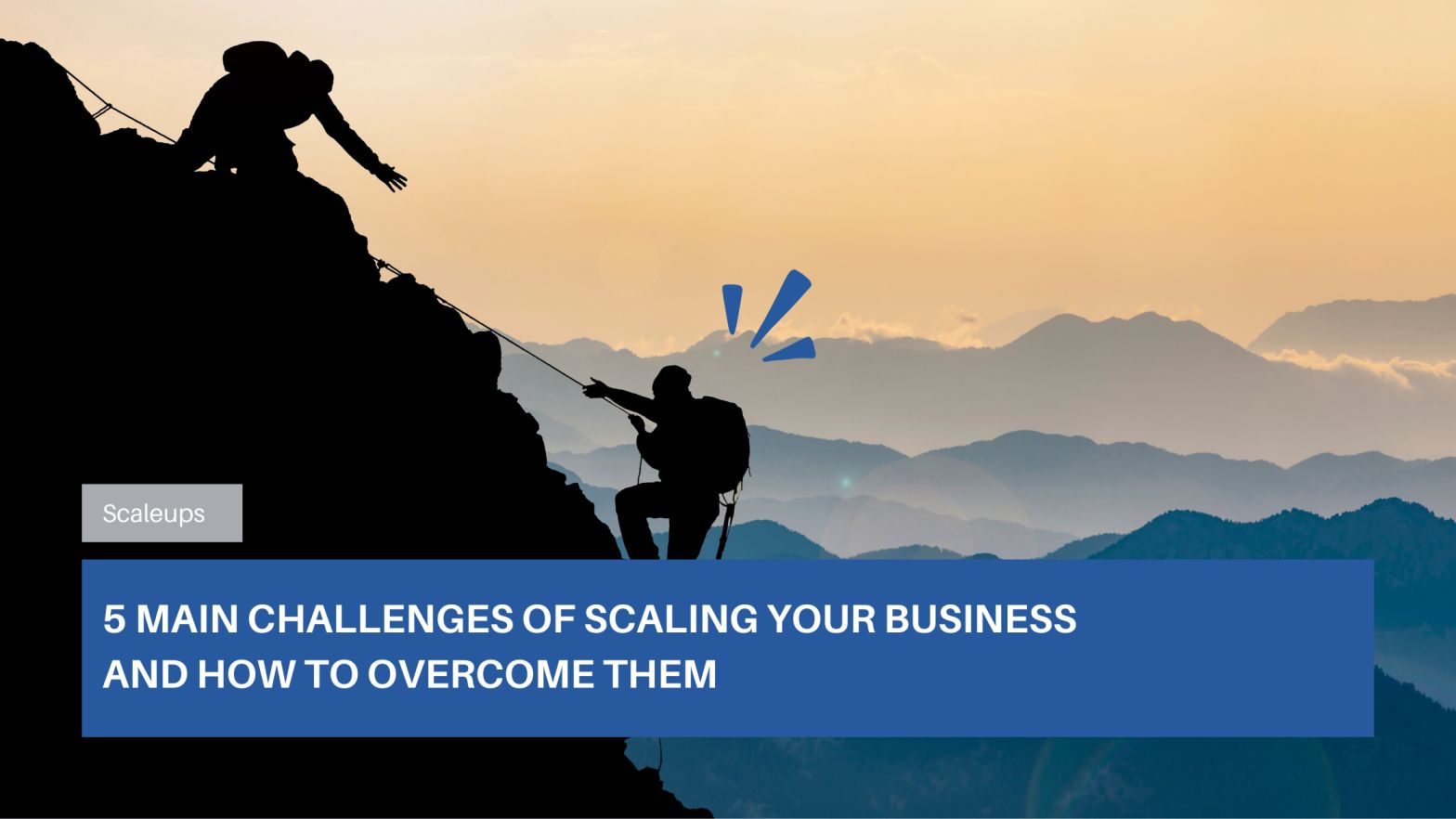
Start up (16)
Scaling in Europe: Understanding the European Scaleup Ecosystem

In the previous entries in our Scaleups series, we explored a number of successful European scaleups and high-growth firms (HGFs), such as Alaiko, De Lift, and nCore. We explained three distinct scaleup profiles: Low Tech – Market Leader, Operational Model – Must Scale, and High Tech – Scale the Technology. Additionally, we examined the five main challenges of scaling a business—such as the do-it-all founder dilemma and managing operational processes during rapid growth—and provided actionable strategies to overcome them.
Today, we expand our focus to the broader European scaleup ecosystem, exploring its unique characteristics and challenges. Our aim is to deepen understanding of what sets Europe apart as a scaleup arena and to outline strategic approaches for navigating its complexities.
5 Main Challenges of Scaling Your Business and How to overcome them
 Scaling a company is a demanding process: only 1 in 10 companies in Europe manages to scale on average by more than 10% annually, over a three-year period. Then, when the growth finally comes, it bring its own set of challenges to manage and sustain it.
Scaling a company is a demanding process: only 1 in 10 companies in Europe manages to scale on average by more than 10% annually, over a three-year period. Then, when the growth finally comes, it bring its own set of challenges to manage and sustain it.
While every startup aims to scale, managing that growth effectively is critical for long-term success and sustainability. Growth affects every aspect of an organization, from its internal structure to its culture and processes. Without the right strategies and tools, the growth that is eagerly pursued can quickly lead to chaos and increased risk.
After all - as we already explained in a previous article - Growing a business is about getting bigger, while scaling up a business is about handling growth efficiently. In the previous article, we discussed several successful examples of scaleups in Europe and introduced the concept of the "Transition Moment." This is the phase when planned growth is achieved, but often comes as a surprise, requiring startups to deploy new resources.
In the upcoming sections, we will outline five major challenges that high-growth companies encounter during this transition moment and provide practical advice to address them effectively.
Scaling in Europe: Top Success Stories and Lessons You Can Apply in 2025

Scaling a business from startup to scaleup is notably challenging, especially in the fragmented and diverse European market. Entrepreneurs often face hurdles such as market fragmentation, lack of regulatory harmonisation, funding limitations, and cultural and institutional challenges. Nonetheless, a notable number of European startups and SMEs have managed to not only survive but thrive, providing crucial insights into their paths of rapid growth.
In this article, we explore successful scaleup cases as highlighted by the European Scaleup Monitor 2023 and compare them with the most recent insights from the 2024 edition. We also integrate several insights from our own experiences and practice.
Is there a replicable formula for scaling success? What elements are essential to the elusive 'scaling DNA'? And how do specific market demands shape the scaling process?
Our goal is to uncover common patterns among these high-growth European firms, offering practical insights for managers and decision-makers to tackle their own growth challenges and seize new opportunities.
Slack – Lessons of an overpromising, overvalued SaaS company acquired
geschrieben von Dott. Arnbjörn EggerzYesterday the final announcement was made that Salesforce acquires Slack for 27bn USD. Marc Benioff is quoted to see "a marriage in heaven".
While the acquisition in my point of view is the best possible outcome for Slack, I have no longer an excuse to kick down the road this quick piece about Slack since long in the making. It addresses some key issues about the business model, the situation in the SaaS space and explains why an acquisition will be the best that can happen to Slack.
The case of Slack – worth a review for SaaS market and enterprise software observers
As the end of July always provided some quieter moments, even in time on Covid-19, I had the time to review some older client’s briefings and internal research papers. This brought a company on the desk again – Slack. When we discussed Slack the first time with clients, I got the question of why I was so picky on Slack with regard to the solution and the business model.
The particular reason is and was that Slack is the poster boy company for a number of trends in the SaaS space and in B2B software worthwhile discussing.
The overpromising solution
Discussing the case of Slack, one needs to remember the initial promise and context of the company. The problem to solve was bad email communication and replacing it with a much better tool for communication. This solution would be more efficient and time saving.
Context was the imminent success of social media networks and the strongly felt need to transfer the “new freedom of communication in the private to the enterprise space. Thus, it was a kind of consumer product for companies onboarding users for free. And it had the promise to be cooler than regular office tech for young professionals, mostly in the IT space.
In technology and consumer markets there is a golden rule – let users choose and follow. While this approach mostly right in most cases, Slack is a B2B product, not a consumer product.
Basically this context is the background for a number of really interesting stats and contradicting facts around Slack like a very loyal user base, low churn, but also slow Growth, slow adoption and monetization.
Overvalued with regard to the business case and its functionality
Therefore, the at the time verdict, like in July and today is – the solution and the company is
Was macht der SaaS Customer Success Manager & warum er in Zukunft besonders wichtig wird 08 2016
geschrieben von Dott. Arnbjörn EggerzDie Rolle des Customer Success Managers in B2B (und nicht nur) SaaS ist in Deutschland/Europa immer noch eher unbekannt. Hier setzte der Vortrag, der rund um den Funnelblick, der Netzwerkverwaltung für SaaS Sales und Marketing in München also Outtake aus dem SaaS Seminar entstanden ist an. Unter dem Titel "Was macht der Customer Success Manager und
Medien
Start-up Ökosysteme in Europa aus Sicht der Forschung - Interview mit Prof. Christian Lechner
geschrieben von Dott. Arnbjörn EggerzStart-up Ökosysteme sind auch in der Wahrnehmung der breiten Öffentlichkeit angekommen. Dies ist ein wichtiger Schritt auf dem Weg der Entwicklung und ein wichtiger Moment für die Innovationskultur und Ökosystementwicklung in Deutschland/Europa, die ich bei Iceventure (und vorher in anderer Funktion) bereits seit über 10 Jahren begleite.
Doch für die weitere qualitative Entwicklung sind einige Punkte von Bedeutung, die neben den allgemeinen Themen wie z.B. Verfügbarkeit von VC oft nicht bekannt sind und diskutierte werden, da sie nur aus der längeren Perspektive wie z.B. in der Unternehmensberatung mit Historie in systemischen Projekten wahrgenommen werden.
Also ein guter Anlass diese in einem Interview mit Prof. Christian Lechner, Experte für Gründungsmanagement und Start-up Ökosysteme zu thematisieren. Dias auch um den nüchternen Blick der Forschung, geschärft durch konsolidiertes Wissen, für die vielen Diskussionen z.B. mit Kunden, die gerne etwas für das regionale Ökosystem tun möchten, aufzubereiten.
Medien
Der Wunderlist Exit im Fokus - App-Geschäftsmodelle, VC-Returns, Ökosystem und Microsoft
geschrieben von Dott. Arnbjörn EggerzWas bedeutet der Wunderkind –Exit?
Endlich ist es soweit. Berlin hat einen (weiteren) Exit und dann auch noch von einem der Berliner Vorzeigestart-ups Wunderlist. Dennoch waren die Reaktionen diverser Marktteilnehmer nicht nur positiv. Grund genug sich den Exit näher anzuschauen und ihn einzuordnen. Denn es gibt eine Reihe von Fragen: Warum jetzt? Wirklich ein guter Exit? Was bedeutet das für IT und SaaS-Firmen?
Ein Punkt gleich vorneweg. Der Kauf durch Microsoft ist für das 6Wunderkinder Team und die Investoren ohne Zweifel ein großer Erfolg. Der Exit gibt dem Ökosystem in Berlin und Deutschland zusätzlich einen Schub und alleine deswegen ist er gut.
Folglich sind die in diesem Artikel dargelegten Punkte keine Kritik an 6Wunderkinder, sondern Reflektionen über Technologieentwicklung und (App-) Geschäftsmodelle, wie sie mit Wunderlist realisiert wurden.
Doch dazu zuerst die Fakten des Wunderlistkaufs, soweit sie in der Öffentlichkeit bekannt sind
Preis und Struktur des Wunderlist Deals
Wunderlist wurde von Microsoft für einen Kaufpreis von 100 bis 200 Mio. Dollar übernommen, was ca. 90 bis 180 Mio. Euro entspricht.
Über die genaue neue Eigentümerstruktur und die Anteile nach dem Exit ist in der Öffentlichkeit bis jetzt nichts bekannt. Es ist aber von einer 100% Übernahme auszugehen.
Digitale Disruption - die Innovation und das Geschäftsmodell von uber im Fokus
geschrieben von Dott. Arnbjörn EggerzDigitalisierung und digitale „Disruption" ist heute in aller Munde. Dank Apps und Internet sehen sich auch alte und etablierte Märkte und Unternehmen neuen Wettbewerbern gegenüber, die plötzlich dank Innovation die Regeln des Angebots und des Marktes neu schreiben. Aber ist das wirklich so? Wie gelingt es den Start-ups das zu erreichen. Genau auf diese Fragen gibt das das Video (oder die einzelnen Teile der Serie) Antwort. Das Startup uber, das Geschäftsmodell und die Innovation werden in drei Teilen analysiert.
Uber Teil 1 - Die Bewertung, Marktvolumen aus VC -Sicht, die User Cases und das Pricing
Teil eins der Videoserie
Medien
Start-up weekend a Bolzano - alcuni spunti per progetti
geschrieben von Dott. Arnbjörn EggerzLeggendo il messaggio dello Startup weekend a Bolzano ho voluto scrivere un post lungo. Tempo e lavoro non l'ha permesso, così mi tengo breve.
 Una ottima iniziativa lo startup-weekend a Bolzano
Una ottima iniziativa lo startup-weekend a Bolzano
Prima di tutto, complimenti per l'iniziativa. È bella, perché ormai noto che intorno al tema dell'imprenditorialità succede qualcosa nella mia, scusate, vostra università. Non nella dimensione tante volte pensata, sognata con altri. Mi scusi prof. Narduzzo, non vuole essere una critica. Al contrario, dà molta fiducia. I piccoli inizi non sono da sottovalutare ...
Ma l'apprezzamento verso un'iniziativa su una tematica che personalmente trovo interessante non basta per spendere parole ad eventuali partecipanti, visto che non solo il mio tempo, ma anche il vostro è scarso.
Ma perché imprenditorialità sociale?
Un motivo particolarmente rilevante per dedicare attenzione al tema è che appare molto strana la differenziazione fra imprenditorialità e imprenditorialità sociale. Non per il fatto che si potrebbe ridurre il sociale nelle parole della realpolitik, "è sociale ciò che crea lavoro" di per sé molto riduttivo, bensì per il fatto che l'imprenditorialità viene trattata come una malattia da curare con l'aggiunto sociale quando, invece, l'aspetto sociale dovrebbe essere parte di ogni nuova iniziativa che si legittima per definizione con "una soluzione migliore ad un problema".
Un contributo alla discussione e l'importanza della tematica start-up nel contesto di oggi
Mi rendo conto che dietro tale scelta si esprime il desiderio di (ri)-innovare la nostra società, e di sicuro si esprime anche uno dei bisogni particolarmente sentiti oggi nel territorio altoatesino (e non solo li). Di conseguenza interpreto il tema dell'imprenditorialità sociale come progetti con forte impatto sociale che hanno bisogno dell'energia del imprenditore e non di un amministratore dello status quo. A questa interpretazione mi permetto di aggiungere alcuni spunti di discussione nati qui a Monaco durante uno studio su un progetto sul tema. Questo progetto è iniziato con valide idee sociali su, ad esempio, miglioramenti per le case di riposo per anziani e tanti progetti volti a sostenere una maggiore giustizia e uguaglianza.
Che progetto imprenditoriale ha impatto sociale – mirate alto
Fini nobili, non c'è dubbio. E' emerso però nella discussione col cliente che esistono problemi reali, con un potenziale enorme impatto alla fabbrica sociale, che magari vale la pena risolvere in prima linea.
In concreto parliamo della crisi economica del debito pubblico (e non solo), chiamato crisi dell'euro, e la tematica sull'uso dei dati. Per entrambi tocca alla vostra/nostra generazione trovare soluzioni che garantiscano la pace. Si, leggete bene, sono prosaico
Das Verbot von Uber in Deutschland ist gerechtfertigt
geschrieben von Dott. Arnbjörn EggerzNachdem ein Verbot von Uber schon seit einiger Zeit diskutiert wurde, ist das Urteil nun vorerst gefallen, auch wenn es nun (überraschend) in die juristische Verlängerung geht. Uber wurde zwischenzeitlich in ganz Deutschland verboten. Und das nicht zu unrecht.
Diese Einschätzung beruht nicht auf Innovations- oder Technologiefeindlichkeit. Auch sind die juristischen Fragestellungen auf die sich die Öffentlichkeit gerne konzentriert eher sekundär, da es nur ein Mittel im Streit von Wettbewerbern ist. Für meine Einschätzung ist die Kompatibilität (market fit) von Markt und Geschäftsmodell im Fokus. Diese leitet sich aus der strukturellen Betrachtung des Taximarktes aus Sicht des Ökonomen und der Frage nach der langfristigen Nachhaltigkeit von neuen Geschäftsmodellen ab, die wir uns jeden Tag mit Kunden stellen. Für Iceventure ist daran auch die These einer Art von „falscher Innovation", eine Erweiterung von Peter Thiels Globalisierungsthese von Innovation, 
geknüpft, die unsere Arbeit in den letzten Jahren begleitet hat.
der Fall Uber – preissenkende Innovation oder Preiskrieg?
Aber der Reihe nach. Zuerst müssen natürlich die Argumente im Fall von Uber dargelegt werden.
Die Kernfrage unserer Betrachtungsweise ist die Beobachtung aus der Innovationstheorie, dass eine Innovation, die sich am Markt nachhaltig durchsetzt, immer etwas billiger und/oder besser machen muss. Eine zweite Bedingung ist die Erhöhung der Wohlfahrt für alle Marktbeteiligten. Und genau hier ist die Frage, ob ein Service wie Uber dies tut.
Die Struktur des Taximarktes
Als erstes Element beschreibt man dazu am besten strukturelle Merkmale des Taximarkts. Entscheidend ist dabei hier ausnahmsweise nicht das im Taximarkt sehr konstante Marktvolumen, sondern die Kostenstruktur der Anbieter zu einem gegebenen Technologiestand.
weiter...
BAVARIAN ENTREPRENEURSHIP - GRÜNDERTUM UND RISIKOKAPITAL IN BAYERN
geschrieben von Dott. Arnbjörn Eggerz Wir freuen uns auf den Termin
Wir freuen uns auf den Termin
BAVARIAN ENTREPRENEURSHIP - GRÜNDERTUM UND RISIKOKAPITAL IN BAYERN
am 09.09.14 um 19:00 Uhr hinzuweisen.
In der spannenden Podiumsdiskussion, organisiert von dem Juniorenkreis des Exportclub Bayern, geht es um das Thema Start-up, Entrepreneurship und Gründung in Bayern und München.
Iceventure freut sich mit am Podium teilzunehmen.
Sequoias Memo zur Youtubeinvestition was Startups & Business Developer davon lernen können
geschrieben von Dott. Arnbjörn EggerzEs ist extrem schwierig einen direkten Einblick in den Entscheidungsprozess von VCs zu bekommen, außer man ist ein VC. Eines der ganz wenigen öffentlich zugänglichen Dokumente ist das Investmentmemo von Botha Roelof für Youtube in 2005 was ich dank Miles Grimshaw gefunden habe. Eine hervorragende Gelegenheit einen Einblick in das Innenleben eines Venture Capitalisten zu bekommen und diverse Start-up Weißheiten (auch aus Vorträgen, Blogs und Coaching) zu überprüfen.
Das vorliegende Investment Memo in Youtube als Startup
Das Memo ist Teil einer Dokumentation eines Gerichtsprozesses. Richtig interessant wird es ab Seite 16. Dort ist das Originalemail an die Partner abgebildet. Das Memo und seine Argumentationsstruktur ist für sich eine Analyse wert. Interessant, wie er die Diskussion unter den Partnern lenkt und Punkte festlegt.
Hier beschränke ich mich (vorerst) auf interessante Punkte für Gründer und was sie aus dem Fall für ihr Startup lernen können.
Award in coveted Bocconi Idea Competition 2010
geschrieben von Dott. Arnbjörn Eggerz
An old saying says one should celebrate as the occasion arises!
Iceventure was recently involved in the business planning of a project in the field of fashion innovation.
Iceventure is proud to announce that this project was chosen among the winners of the Bocconi Idea Competition in Fashion, 2010.
Congratulations and good luck.
Innovazione in settori esistenti – la telecomunicazione
geschrieben von Dott. Arnbjörn EggerzDedico quest'articolo a tutti miei amici italiani.
 Come nasce l'innovazione? Nel rispondere a questa domanda si dimentica spesso di citare il miglioramento di prodotti o servizi esistenti secondo il concetto "innovazione su design". Dimenticare non è un delitto e qualche volta le esperienze personali offrono uno spunto interessante per riflettere e ricordare.
Come nasce l'innovazione? Nel rispondere a questa domanda si dimentica spesso di citare il miglioramento di prodotti o servizi esistenti secondo il concetto "innovazione su design". Dimenticare non è un delitto e qualche volta le esperienze personali offrono uno spunto interessante per riflettere e ricordare.
Prendete il mio caso.
Per diversi anni, chissà per quale motivo, mi sono spesso trovato volente o nolente a dialogare con Telecom Italia e ho scoperto una cosa:...

